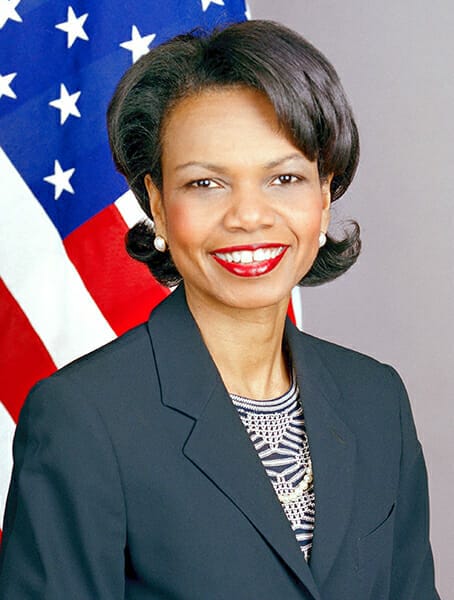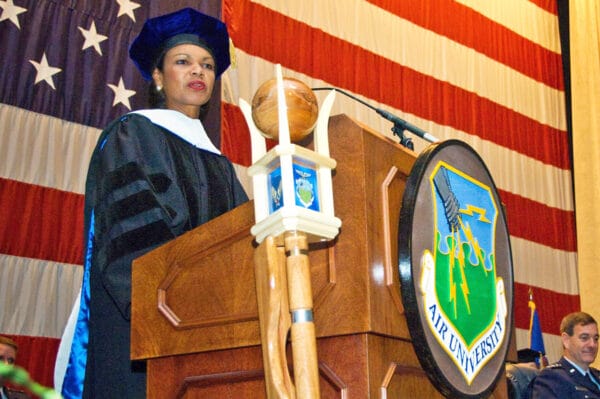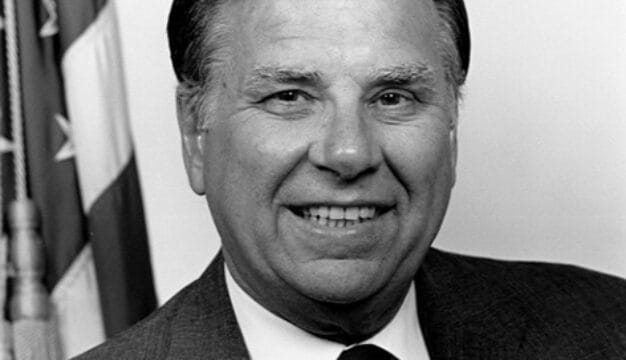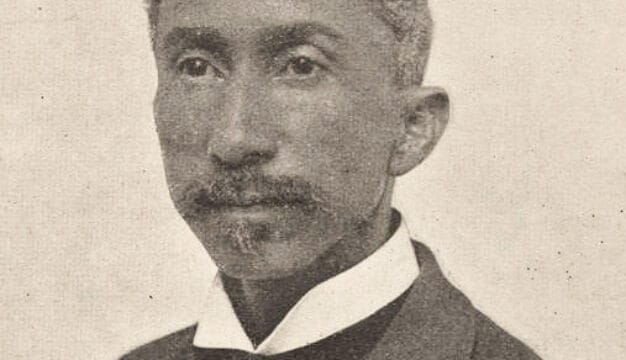Condoleezza Rice
 Condoleezza Rice
Birmingham native Condoleezza Rice (1954- ) is a foreign policy expert who served as provost of Stanford University and later as National Security Advisor and Secretary of State under Pres. George W. Bush. She was the first African America woman to hold those positions. She has been criticized for not being prepared for the September 11, 2001, terrorist attacks and for promoting the March 2003 invasion of Iraq based on questionable intelligence about weapons of mass destruction in that country.
Condoleezza Rice
Birmingham native Condoleezza Rice (1954- ) is a foreign policy expert who served as provost of Stanford University and later as National Security Advisor and Secretary of State under Pres. George W. Bush. She was the first African America woman to hold those positions. She has been criticized for not being prepared for the September 11, 2001, terrorist attacks and for promoting the March 2003 invasion of Iraq based on questionable intelligence about weapons of mass destruction in that country.
Rice was born November 14, 1954, in Birmingham, Jefferson County, to John Wesley Rice Jr. and Angelena Rice; she was an only child. Her mother gave her the name “Condoleezza” after the Italian phrase con dolcezza, meaning “with sweetness.” Her mother was a science teacher at Fairfield Industrial High School in the Fairfield neighborhood; her pupils included future Birmingham mayor Richard Arrington Jr. and baseball star Willie Mays. Her father had been a gym teacher, high school teacher, and guidance counselor, and later was pastor of the Westminster Presbyterian Church, a largely middle class African American congregation in the Titusville neighborhood where the family lived.
Rice began studying piano at an early age under the tutelage of her mother and was home-schooled for a time, keeping to a strict schedule of schoolwork and piano practice. She was raised in a sheltered environment; up until 1963, she was largely unaware of segregation and the larger civil rights struggle. Rice’s father knew Rev. Fred Shuttlesworth and supported the goals of the civil rights movement but not some of the tactics, particularly the “children’s march” that was a part of the Birmingham Campaign of 1963. Rice’s parents frequently kept her home from Brunetta C. Hill Elementary school in 1963 for fear of her getting caught up in trouble as other children skipped school to take part in protests. Because of the fear of possible violence from armed segregationists driving through their African American neighborhood, in the evenings Rice’s father joined his neighbors in patrolling local streets, armed with his shotgun. Rice also was friends with Denise McNair, one of the four children killed in the bombing of the Sixteenth Street Baptist Church in Birmingham in September 1963, and was in the crowd outside of the Sixth Avenue Baptist Church during the funeral. The family moved to Tuscaloosa, Tuscaloosa County, in 1966, when Rice’s father became the dean of students at Stillman College. She entered the eighth grade at Druid High School at age 11, skipping the seventh grade.
Education
In 1968, the family relocated to Denver, Colorado, when Rice’s father became assistant director of admissions at the University of Denver. Rice attended St. Mary’s Academy, a private Catholic high school for girls and graduated in 1970 at the age of 15. She then entered the University of Denver, intending to major in piano, but she became interested in international relations and studied under noted Soviet expert Josef Korbel, father of future Secretary of State Madeline Albright. Rice completed a bachelor’s degree in 1974 and then earned a masters’ degree from the University of Notre Dame in 1975 in international relations. She returned to the University of Denver to pursue a doctorate in Soviet and international studies and was awarded a PhD in 1981. She would later revise her dissertation on political and military relations in Czechoslovakia and publish it in 1984 as The Soviet Union and the Czechoslovak Army, 1948-1983: Uncertain Allegiance; it received mixed reviews.
Rice was awarded a postdoctoral fellowship at Stanford University in Palo Alto, California, and joined the political science faculty there in 1981; she taught at Stanford until 1993, specializing in arms control and disarmament issues and winning awards for her teaching. During these years, she also served as foreign policy advisor to Colorado Democratic senator Gary Hart during his 1984 presidential campaign. Rice, however, had been gravitating toward Republican policies since voting for Ronald Reagan in 1980 and was later named a Senior Fellow at both the Institute for International Studies and the conservative Hoover Institution, both at Stanford. With history professor Alexander Dallin, Rice edited The Gorbachev Era (1986), a compilation of lectures on the Soviet Union to which she contributed chapters on the Soviet military and the Soviet alliance system. From 1989 to 1991, Rice served in the administration of Pres. George H. W. Bush as an important Soviet analyst and advisor on the National Security Council at a time when the Eastern Bloc and Soviet Union were disintegrating. Rice’s position raised her profile in both the political and corporate arena; she served on a number of corporate boards during the 1990s, including oil giant Chevron, which named a 129,000-ton oil tanker in her honor, the SS Condoleezza Rice (it was renamed in 2001).
Administration
Returning to Stanford University in 1991 to teach, Rice was appointed provost in 1993 by university president Gerhard Casper. Serving as provost until 1999, she was involved in controversial budget decisions, designed to save the financially struggling institution money, that resulted in a budget surplus within a few years. Many members of the Stanford community were upset at the decision to fire the school’s highest ranking Hispanic dean and cut services and staff as well as her unilateral decision-making process. In addition, she was criticized for being abrasive with faculty and ignoring their input and not supporting affirmative action policies sufficiently. Faculty concerns led to a U.S. Department of Labor gender discrimination investigation.
In 1995, Rice coauthored, with political scientist and former NSC staff member Philip Zelikow, Germany Unified and Europe Transformed: A Study in Statecraft. The book argues that Pres. George H. W. Bush played a significant role in the events that led to the reunification of East and West Germany and was praised for its inside information on the decision-making process of the Bush administration and for the use of Soviet documents.
National Security Advisor
In 1998, Rice was approached by then-Texas governor George W. Bush to provide foreign policy advice during his presidential campaign, joining a group of experts from previous Republican administrations. After Bush’s election, Rice was appointed National Security Advisor in January 2001. Throughout her service in the Bush administration, Rice was one of the president’s closest confidantes, but she was often at odds with Vice President Richard Cheney and particularly Secretary of Defense Donald Rumsfeld over the control and direction of U.S. foreign policy.
Some of the major policy decisions that she helped guide early in her tenure included the renunciation of the Kyoto climate protocol and the Anti-Ballistic Missile treaty as well as a return to negotiations with North Korea, after initial announcements to the contrary. Rice is largely remembered, however, for her failure as national security advisor to heed warnings from counterterrorism and intelligence experts that al Qaeda operatives intended to attack United States’ interests. After the September 11, 2001, attacks, Rice’s job changed; she spent more time reviewing intelligence reports and speaking with the media. The United States engaged in military action in Afghanistan in an attempt to defeat the ruling Taliban, which provided safe haven to al Qaeda.
Focus on Iraq
After initial success, however, the administration’s attention moved from the war in Afghanistan to disarming Iraq. In the fall of 2002, Rice joined with other officials in the White House Iraq Group and became one of the administration’s chief public advocates for the invasion. In September 2002, she referenced a nuclear mushroom cloud as the worst-case scenario for failure to disarm Iraq. She also presided over a new formulation of policy that came to be called the Bush Doctrine, which espoused preemptive war as tool of foreign policy; the doctrine was seen by many scholars and critics as preventive war, a more ambiguous justification under international law. Later in January 2003, Rice published an editorial in The New York Times, entitled “Why We Know Iraq is Lying,” in which she discussed Iraq’s efforts to avoid compliance with United Nations Security Council resolutions and intimated the possible ramifications of Iraq possessing nuclear weapons. When the U.S.-led invasion and subsequent occupation of Iraq failed to uncover any weapons or evidence of manufacturing capabilities or any ties to Islamic terrorists, Rice and other members of the Bush administration were criticized by government officials, the press, and experts for poorly coordinating Iraq policy during the occupation.
On other foreign policy fronts, however, the Bush Administration and by extension Rice received high praise. Most notably, the United States remained safe from additional terrorist attacks, and the President’s Emergency Plan for AIDS Relief, implemented in 2003, has been widely commended for its effectiveness in treating and preventing AIDS in the world’s poorer countries and caring for the millions of orphans produced by the crisis.
Secretary of State
 Condoleezza Rice Honored at Air University
After Pres. Bush won reelection in 2004, Rice replaced Colin Powell as Secretary of State in early 2005, becoming the first African American women to hold that office. In that capacity, she worked to improve relations with other countries in the wake of the Iraq war and to spread democracy, particularly in the Middle East, while trying to prevent Iran from expanding its nuclear program. The effort resulted in several European states and the United States offering Iran economic incentives to halt its uranium enrichment program. In addition, Rice implemented a broader policy agenda called “Transformational Diplomacy,” an agenda that involved relocating U.S. diplomats and other Foreign Service personnel to areas of greater need, urging personnel to serve in dangerous locations and to increase their skills, and focusing on regions and regional problems rather than specific states.
Condoleezza Rice Honored at Air University
After Pres. Bush won reelection in 2004, Rice replaced Colin Powell as Secretary of State in early 2005, becoming the first African American women to hold that office. In that capacity, she worked to improve relations with other countries in the wake of the Iraq war and to spread democracy, particularly in the Middle East, while trying to prevent Iran from expanding its nuclear program. The effort resulted in several European states and the United States offering Iran economic incentives to halt its uranium enrichment program. In addition, Rice implemented a broader policy agenda called “Transformational Diplomacy,” an agenda that involved relocating U.S. diplomats and other Foreign Service personnel to areas of greater need, urging personnel to serve in dangerous locations and to increase their skills, and focusing on regions and regional problems rather than specific states.
In October 2005, Rice, joined by British foreign minister Jack Straw, returned to Alabama for a series of speeches and activities and attended the memorial service for civil rights pioneer Rosa Parks in Montgomery. After leaving the State Department in 2009, Rice returned to teaching political science as the Denning Professor in Global Business and the Economy at the Stanford Graduate School of Business and serves as a senior fellow on public policy at the university’s Hoover Institution.
In 2011, Rice published No Higher Honor: A Memoir of My Years in Washington, which looks at her service in the Bush Administration. Throughout much of her life, Rice has been an enthusiastic sports fan, particularly of professional football, and has often expressed her interest in being commissioner of the National Football League. She also continues to play piano and has played with renowned cellist Yo-Yo Ma. She has since become an avid golfer and in 2012 was one of the first two women admitted to the Augusta National Golf Club in Georgia. In October 2013, Rice was selected as a member of the College Football Playoff Selection Committee, which will choose the four teams that will participate in the NCAA National Championship Playoffs.
In 2016, Rice made news when she recommended ExxonMobil chief Rex Tillerson as Secretary of State to president-elect Donald Trump while the consulting firm she is a principal in, RiceHadleyGates LLC, was representing the energy firm. Tillerson would be heavily criticized by many foreign policy experts for his tenure that saw much reduction of staff at the agency. Pres. Trump fired Tillerson over policy differences after 14 months, which is considered a very short time for the position.
More recently, Rice chaired the 14-member Commission on College Basketball that was formed in 2017. The commission was charged with developing reforms to men’s college basketball, which had been beset by a wide-ranging scandal that involved numerous schools, including the University of Alabama and Auburn University. The commission’s April 2018 report recommended greater financial penalties for rules violations, more financial transparency, and allowing 18-year-olds to enter the National Basketball Association draft.
Works by Condoleezza Rice
The Soviet Union and the Czechoslovak Army, 1948-1983: Uncertain Allegiance (1984)
The Gorbachev Era (with Alexander Dallin, 1986)
Germany Unified and Europe Transformed: A Study in Statecraft (with Philip Zelikow, 1995)
Extraordinary, Ordinary People: A Memoir of Family (2010)
No Higher Honor: A Memoir of My Years in Washington (2011)
Democracy: Stories from the Long Road to Freedom (2017)
Political Risk: How Businesses and Organizations Can Anticipate Global Insecurity (2018)
Further Reading
- Bumiller, Elizabeth. Condoleezza Rice: An American Life. New York: Random House, 2007.
- Felix, Antonia. Condi: The Condoleezza Rice Story. New York: Newmarket Press, 2005.
- Mabry, Marcus. Twice as Good: Condoleezza Rice and Her Path to Power. New York: Modern Times, 2007.



